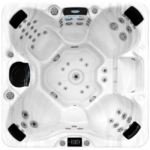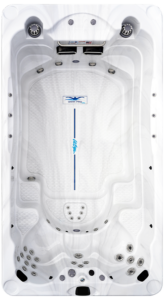Vinyl vs. Fiberglass vs. Plaster Pools, The match up:

When deciding on what type of in ground pool to install, it is essential to do the proper research before buying. The decision between vinyl, fiberglass or gunite (otherwise known as plaster) for in ground pool selection generally comes to down to factors such as installation costs, how long it will take to install, overall maintenance, and appearance. Everyone’s tastes are different but when it comes to cost and upkeep, vinyl is the clear winner. There’s no reason to be afraid of vinyl as this is not a new technology. Vinyl liner pools may be new to you, but they are certainly not new to Secard Pools.
Plaster pools do offer the most options in terms of design. Depending on your budget, you can design a plaster pool that is one of the most visually-pleasing spaces in your backyard, including those that feature grottos, rock slides, a waterfall or are lagoon-like in appearance. The shape of the pool itself, such as assorted asymmetrical designs, is another design option. Though asymmetrical shapes and water features are a possibility for vinyl pools as well, you are typically very limited when it comes to your options with fiberglass pool shapes and sizes.
Unlike vinyl pools, fiberglass and plaster pools are very expensive to install. The installation costs for a vinyl pool are about $11,000 to $25,000, while installing a plaster pool could cost you anywhere from $35,000 to a staggering $150,000 and fiberglass pools ranging from $20,000 to $40,000. The costs of installing a plaster pool could be even higher depending on how intricate your design plan is.
Not only are vinyl pools less expensive to install, they are also much quicker to install! Adding a vinyl pool to your property generally takes a few weeks, while installing a plaster pool can take anywhere from two to four months. Fiberglass pools tend to be on the shorter end of the scale for installation because you typically have to choose from a shell configuration that the installer has in stock.
While you generally have to replace your vinyl pool liner every 10 years, it is still much less expensive than resurfacing a plaster or fiberglass pool which needs to be done every 10 to 15 years. Additionally, vinyl pool liners and fiberglass shells are resistant to staining while the porous nature of a plaster design makes staining a frequent possibility. Plaster pools require more pool chemicals to keep the pool clean and stain-free. Vinyl pool liners and fiberglass shells are not only stain-resistant but are also algae-resistant. Many pool liners now feature thicker liners that are durable against wear and tear. You will therefore save money on pool chemicals and other maintenance costs if you choose a vinyl liner or fiberglass pool.
If water features are important to your overall pool design, note that such features are now a possibility with all three pool types, though they were previously features for plaster pools only. Browse pool packages to find water features and other design items that work for your vision.
It’s hard to argue with the overwhelming pros of vinyl liner pool design as it costs relatively little to install, takes only a short time to install, is easy to maintain, and offers many of the same features as a plaster pool! If you want a pool for your property but don’t have hours upon hours to dedicate to the scrubbing of algae and other time-
consuming pool maintenance issues, then vinyl liner pools are the optimal design for you.
Take a look at the following chart comparison for the visual touchy-feely:
| Compare Features | Vinyl | Fiberglass | Plaster |
|---|---|---|---|
| Affordable | |||
| Short installation time | |||
| City or county permits required | |||
| Tractor access required | |||
| No crane access required | |||
| Customizable shape | |||
| Customizable depth | |||
| Unlimited shapes and sizes | |||
| Can withstand an earthquake | |||
| Smooth surface | |||
| No acid washing required | |||
| Heater friendly | |||
| Salt water friendly | |||
| Low resurface cost | |||
| Easy to clean | |||
| Easy to repair |






I grew up with a vinyl liner pool, if fact it was a Secard pool done in 1965. It performed well, was easy to maintain ( I was the pool kid) and the liner lasted well over ten years. I have a cement pool today, and while I like some features, I do hate the way the plaster stains and discolors. If you forget to clean a vinyl liner one week, it is not big deal. Just add chlorine and vacuum it like new. I feel vinyl liners are easier to mainatin and not so picky.
We have a Labrador retriever and worry that with anything but a cement pool he would cause us to make frequent repairs, any comments on that issue ? We are still undecided which way to go for this pool project.
Bunny,
We don’t recommend you let your dog in any pool as the hair and body oils of a dog play hell on your water chemistry. However, it is sometimes impossible to keep some dogs (especially a Lab) out of your pool and we have many customers with vinyl pools who’s dogs swim more than the owners do. It’s important to know that with allowing your dog in a vinyl pool, you risk damaging your liner. Especially if your dog has very sharp claws (more likely with “inside dogs”), or most commonly, scratches a lot in one area (like if they’re trapped and trying to get out). I have seen many customers who’s dogs are frequently in the pool never have an issue but it is very important that your dog has an easy exit should it need to get out of the pool without assistance. Make sure your pool new pool has a set of steps and train your dog to know where they are located. This will minimize the likelihood of an issue with the pool liner and ensure the safety of man’s best friend. I hope this helps.
Bob
I am considering a vinyl pool. I like to swim laps and was curious how the vinyl liner “feels” when I go to to flip turns. Will it be like pushing off of a piece of paper?
Brook,
If you’re referring to an in ground vinyl liner pool, you will know no difference in your kick turns. The walls are solid behind the liner and will provide a firm surface for you to kick off. However, if you’re considering an above ground pool, the walls will be a bit spongy when kicking off as there is nothing behind the liner to support it. I hope this information was helpful and thank you for the inquiry.
Bob
we are in the process of fixing our gunite pool, choosing between staying with gunite or resurfacing it with fiberglass. Now you’ve added vinyl to the mix. Can I reface the existing pool with vinyl?
Rose,
Actually, you can remove vinyl from the mix. Vinyl pools are a different animal and liners do not play well with gunite pools. The main issue is the curved wall to floor transitions and the odd shaped steps. I hope this information is helpful and thank you for the inquiry.
Bob